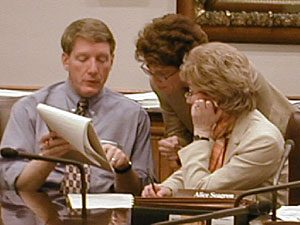By end of session, few fans for Profile of Learning were left
May 20, 2003
 |
| House and Senate conferees, and officials from the Pawlenty administration, put final touches on a K-12 package on Monday. (MPR Photo/Tim Pugmire) |
St. Paul, Minn. — Legislators have been trying to kill the Profile of Learning since it became a requirement in all Minnesota public schools five years ago. The controversial standards moved the focus in classrooms away from textbook memorization. Students instead demonstrated what they'd learned through projects and performances. But many found the system tough to navigate and the requirements difficult to understand.
"It is simple to understand for parents, and simple for students, simple for teachers. It's something that we can go out there and explain in 20 minutes. And people will understand it and won't go away wondering what they just heard," said Rep. Barb Sykora, R-Excelsior, chairwoman of the House Education Policy Committee.
The bill establishes rigorous standards in five core subjects: language arts, mathematics, science, social studies and the arts. The social studies standards includes history, geography, economics and civics. Specific grade-by-grade expectations are already written for language arts and math. For example, sixth graders will be expected to know how to find the area and circumference of a circle. Statewide tests will be tied to language arts, math and science, as required under the federal No Child Left Behind law.
"To comply with No Child Left Behind, we are also now committing ourselves to getting good participation rates in elementary and middle school, and good graduation rates. And having multiple ways for students to learn, through the arts or through career and technical education, I think is an important part of the strategy for meeting those assessments of No Child Left Behind," said Sen. Steve Kelley, DFL-Hopkins, chairman of the Senate Education Committee, who pushed to include the arts as a core subject.
Gov. Pawlenty made a repeal of the Profile of Learning a key campaign issue. He directed his education commissioner, Cheri Pierson Yecke, to begin developing replacement standards long before legislators reached an agreement. The bill largely preserves the work she's completed thus far and directs her to begin working on standards for the remaining subjects.
"This signals a historic change in direction to a knowledge-based, skill-based, content-based, rigorous academic curriculum for the children of Minnesota. And I'm just very, very pleased. Tonight is a very important night for the history of education in this state," Yecke said.
The votes were lopsided. The bill passed in the Senate 64-to-3. The vote in the House was 125-to-9. Education organizations are also on board. Charles Kyte of the Minnesota Association of School Administrators says his members will work hard to help implement the new standards in their districts.
"People have been waiting for this to be resolved. Educators are ready for this to quit being a political issue. And they're ready to roll up their sleeves and make a good clear understandable set of standards work for the kids of Minnesota," he said.
Schools will begin implementing those language arts and math standards in the next school year. The class of 2008 will be the first to meet new credit requirements to graduate. State education officials plan to conduct a series of 12 regional meetings around the state beginning next month to help teachers and school administrators get up to speed on the new standards.
|
News Headlines
|
Related Subjects
|

